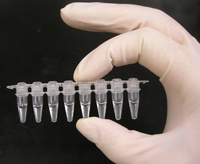
Photo from wikipedia
Purpose Complicated UTIs (cUTIs) cause significant morbidity and healthcare resource utilization and cost. Standard urine culture has limitations in detecting polymicrobial and non-E. coli infections, resulting in the under-diagnosis and… Click to show full abstract
Purpose Complicated UTIs (cUTIs) cause significant morbidity and healthcare resource utilization and cost. Standard urine culture has limitations in detecting polymicrobial and non-E. coli infections, resulting in the under-diagnosis and under-treatment of cUTIs. In this study, patient-reported outcomes were compared between treated and untreated patients when an advanced diagnostic test combining multiplex-polymerase chain reaction (M-PCR) with a pooled antibiotic susceptibility method (P-AST) was incorporated into the patients’ clinical management. Methods Patients who had symptoms typical of cUTI and positive M-PCR/P-AST test results were recruited from urology clinics. Symptom reduction and clinical cure rates were measured from day 0 through day 14 using the American English Acute Cystitis Symptom Score (ACSS) Questionnaire. Clinical cure was defined based on the sum of the scores of four US Food and Drug Administration (FDA) symptoms and the absence of visible blood in the urine. Results Of 264 patients with suspected cUTI, 146 (55.4%) had exclusively non-E. coli infections (115 treated and 31 untreated) and 190 (72%) had polymicrobial infections (162 treated and 28 untreated). Treated patients exhibited greater symptom reduction compared to untreated ones on day 14 for those with exclusively non-E. coli organisms (3.18 vs 1.64, p = 0.006) and polymicrobial infections (3.52 vs 1.41, p = 0.002), respectively. A higher percentage of treated patients than of untreated patients achieved clinical cure for polymicrobial infections on day 14 (58.7% vs 36.4%, p = 0.049). Conclusion Patients with cUTIs treated based on the M-PCR/P-AST diagnostic test had significantly improved symptom reduction and clinical cure rates compared to untreated patients among those with non-E. coli or polymicrobial infections.
Journal Title: Research and Reports in Urology
Year Published: 2023
Link to full text (if available)
Share on Social Media: Sign Up to like & get
recommendations!